| Srl | Item |
| 1 |
ID:
180415


|
|
|
|
|
| Summary/Abstract |
When we think of a technological race to achieve geopolitical hegemony (some might even say technological Cold War), most of the times two concepts appear in our mind: artificial intelligence and 5G. Warnings about the perils of the use of artificial intelligence have not stopped governments or even private corporations such as Google from pursuing supremacy in the field. The case of 5G is even more notorious. The anxiety of Western countries to find a local champion to dispute China's Huawei leadership is well known. Those are not the only disruptive technologies that are powerful assets in the chessboard of geopolitics. Industrial 3D printing could join them in a not distant future.
|
|
|
|
|
|
|
|
|
|
|
|
|
|
|
|
| 2 |
ID:
179201
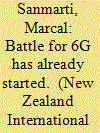

|
|
|
|
|
| Summary/Abstract |
A remarkable technology, 5G allows us not just to surf the internet faster, but also makes possible the internet of things or IoT - a network of physical objects that are embedded with sensors, software and other technologies for the purpose of connecting and exchanging data with other devices and systems over the internet. But the 5G technology will be remembered also for starting a global race to own new communication technologies, a contest that China is winning. Geopolitical rifts have led to some countries stripping Chinese-made equipment from their 5G networks. And the next battle, for 6G supremacy, has already begun.
|
|
|
|
|
|
|
|
|
|
|
|
|
|
|
|
| 3 |
ID:
182265
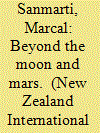

|
|
|
|
|
| Summary/Abstract |
In our immediate solar neighbourhood in space is the Sun and then in order Mercury, Venus, Earth (and its satellite the Moon), Mars (and its satellites Fobos and Deimos) and then a series of asteroids. This is the arena for a growing international effort, both co-operative and competitive, not only in exploration but also in increasingly commercial terms. A race to exploit resources to be found in space, not least in the asteroid belt, is developing. These space activities have both political and economic impact on Earth. Greater collaboration is essential in future, especially to deal with potential dangers from space.
|
|
|
|
|
|
|
|
|
|
|
|
|
|
|
|
| 4 |
ID:
179151
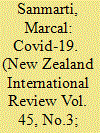

|
|
|
|
|
| Summary/Abstract |
Marcal Sanmarti discusses the impact of the global pandemic on geopolitics and national strategies.
|
|
|
|
|
|
|
|
|
|
|
|
|
|
|
|
| 5 |
ID:
180397


|
|
|
|
|
| Summary/Abstract |
Marcal Sanmarti discusses the medical geopolitics of the world's Covid-19 response and the limits of multilateralism.
|
|
|
|
|
|
|
|
|
|
|
|
|
|
|
|
| 6 |
ID:
179172


|
|
|
|
|
| Summary/Abstract |
In the September-October 2020 issue of this journal (vol 45, no 5), we saw how many countries and private corporations are getting involved in a new space race. Reusable rockets have revolutionised access to space, slashing costs of delivery to and from the stratosphere. Following American private corporations, the Russian space agency Roscosmos has recently announced that in its Amur programme it will soon use reusable rockets.1 New Zealand is no exception. Rocket Lab is reusing part of its Electron launch vehicles. We all know that New Zealand, with a population of just 5 million, has a tradition of punching above its weight. This country is a primary industries powerhouse, probably hosts the best known and most successful rugby team on the planet and is seen internationally as a champion in the fight against Covid-19. New Zealand is also rather successful in the commercial space sector - quite ironic considering that locals refer to themselves as kiwis, the name of a local flightless bird.
|
|
|
|
|
|
|
|
|
|
|
|
|
|
|
|
| 7 |
ID:
180410
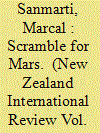

|
|
|
|
|
| Summary/Abstract |
A new arena of international competition is emerging - in space. The New Space Race is quite different from the old one, when super-powers vied to put men or women in space or on the Moon. There are many more competitors but also more celestial bodies to conquer. Dozens of countries have plans to reach the Moon in the near future. But some are looking well beyond the Moon, even to Mars. The scramble to reach the red planet is very different, however, from the concurrent race to return to the Moon. It is way more complex and expensive for starters.
|
|
|
|
|
|
|
|
|
|
|
|
|
|
|
|
| 8 |
ID:
179181
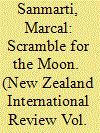

|
|
|
|
|
| Summary/Abstract |
NASA's plan to return to the Moon is probably familiar to most. Former US President Donald Trump set a very ambitious goal: to have American women and men stepping on the Moon by 2024. Many consider that an unrealistically short timescale. But international competition to go back to the Moon is fierce. It is not just the United States and China competing to send humans there again. Many other countries have plans, not just giants like Russia, India or the European Union. Japan, Israel, the United Arab Emirates, Canada, the United Kingdom, Turkey and even tiny Luxemburg also have plans.
|
|
|
|
|
|
|
|
|
|
|
|
|
|
|
|
| 9 |
ID:
180396
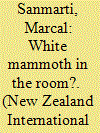

|
|
|
|
|
| Summary/Abstract |
Before the arrival of the Covid-19 pandemic, the white elephant in the room was climate change. But an even bigger disrupting reality might be emerging. Because this new reality is bigger than our own planet Earth. The emergence of a space economy is not a futuristic event. It is already a multi-billion-dollar business. The demand for geo-location apps and internet connection during the pandemic, both for entertainment and professional reasons, is keeping the satellite business growing. And as space mining is becoming a reality, the competition for resources outside our planet might change our understanding of geopolitics forever.
|
|
|
|
|
|
|
|
|
|
|
|
|
|
|
|